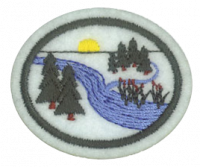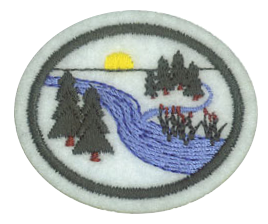Difference between revisions of "AY Honors/Rivers and Streams/Answer Key/es"
From Pathfinder Wiki
< AY Honors | Rivers and StreamsAY Honors/Rivers and Streams/Answer Key/es
(Updating to match new version of source page) |
|||
| (4 intermediate revisions by the same user not shown) | |||
| Line 25: | Line 25: | ||
{{CloseReq}} <!-- 2c --> | {{CloseReq}} <!-- 2c --> | ||
{{ansreq|page={{#titleparts:{{PAGENAME}}|2|1}}|num=2d}} | {{ansreq|page={{#titleparts:{{PAGENAME}}|2|1}}|num=2d}} | ||
| − | <noinclude> | + | <noinclude></noinclude> |
| − | </noinclude> | + | {{CloseReq}} |
| − | + | ||
| − | + | {{clear}} | |
| − | |||
{{ansreq|page={{#titleparts:{{PAGENAME}}|2|1}}|num=2e}} | {{ansreq|page={{#titleparts:{{PAGENAME}}|2|1}}|num=2e}} | ||
| − | + | {{CloseReq}} | |
| − | {{CloseReq}} | ||
| − | |||
| − | |||
{{ansreq|page={{#titleparts:{{PAGENAME}}|2|1}}|num=2f}} | {{ansreq|page={{#titleparts:{{PAGENAME}}|2|1}}|num=2f}} | ||
| − | + | {{CloseReq}} | |
| − | {{CloseReq}} | ||
| − | |||
| − | |||
{{ansreq|page={{#titleparts:{{PAGENAME}}|2|1}}|num=2g}} | {{ansreq|page={{#titleparts:{{PAGENAME}}|2|1}}|num=2g}} | ||
| − | + | {{CloseReq}} | |
| − | {{CloseReq}} | ||
| − | |||
| − | |||
{{ansreq|page={{#titleparts:{{PAGENAME}}|2|1}}|num=2h}} | {{ansreq|page={{#titleparts:{{PAGENAME}}|2|1}}|num=2h}} | ||
| − | + | {{CloseReq}} | |
| − | {{CloseReq}} | ||
| − | |||
| − | |||
{{ansreq|page={{#titleparts:{{PAGENAME}}|2|1}}|num=2i}} | {{ansreq|page={{#titleparts:{{PAGENAME}}|2|1}}|num=2i}} | ||
| − | + | {{CloseReq}} | |
| − | {{CloseReq}} | ||
| − | |||
| − | |||
{{ansreq|page={{#titleparts:{{PAGENAME}}|2|1}}|num=2j}} | {{ansreq|page={{#titleparts:{{PAGENAME}}|2|1}}|num=2j}} | ||
| − | + | {{CloseReq}} | |
| − | {{CloseReq}} | ||
| − | |||
| − | |||
{{ansreq|page={{#titleparts:{{PAGENAME}}|2|1}}|num=2k}} | {{ansreq|page={{#titleparts:{{PAGENAME}}|2|1}}|num=2k}} | ||
| − | + | {{CloseReq}} | |
| − | {{CloseReq}} | ||
| − | |||
| − | |||
{{ansreq|page={{#titleparts:{{PAGENAME}}|2|1}}|num=2l}} | {{ansreq|page={{#titleparts:{{PAGENAME}}|2|1}}|num=2l}} | ||
| − | + | {{CloseReq}} | |
| − | {{CloseReq}} | ||
| − | |||
| − | |||
{{ansreq|page={{#titleparts:{{PAGENAME}}|2|1}}|num=2m}} | {{ansreq|page={{#titleparts:{{PAGENAME}}|2|1}}|num=2m}} | ||
| − | + | {{CloseReq}} | |
| − | {{CloseReq}} | ||
| − | |||
| − | |||
{{ansreq|page={{#titleparts:{{PAGENAME}}|2|1}}|num=2n}} | {{ansreq|page={{#titleparts:{{PAGENAME}}|2|1}}|num=2n}} | ||
| − | + | {{CloseReq}} | |
| − | {{CloseReq}} | ||
| − | |||
| − | |||
{{ansreq|page={{#titleparts:{{PAGENAME}}|2|1}}|num=2o}} | {{ansreq|page={{#titleparts:{{PAGENAME}}|2|1}}|num=2o}} | ||
| − | + | {{CloseReq}} | |
| − | {{CloseReq}} | ||
| − | |||
| − | |||
{{ansreq|page={{#titleparts:{{PAGENAME}}|2|1}}|num=2p}} | {{ansreq|page={{#titleparts:{{PAGENAME}}|2|1}}|num=2p}} | ||
| − | + | {{CloseReq}} | |
| − | {{CloseReq}} | ||
| − | |||
| − | |||
{{ansreq|page={{#titleparts:{{PAGENAME}}|2|1}}|num=2q}} | {{ansreq|page={{#titleparts:{{PAGENAME}}|2|1}}|num=2q}} | ||
| − | + | {{CloseReq}} | |
| − | {{CloseReq}} | ||
| − | |||
| − | |||
{{ansreq|page={{#titleparts:{{PAGENAME}}|2|1}}|num=2r}} | {{ansreq|page={{#titleparts:{{PAGENAME}}|2|1}}|num=2r}} | ||
| − | + | {{CloseReq}} | |
| − | {{CloseReq}} | ||
| − | |||
| − | |||
{{ansreq|page={{#titleparts:{{PAGENAME}}|2|1}}|num=2s}} | {{ansreq|page={{#titleparts:{{PAGENAME}}|2|1}}|num=2s}} | ||
| − | |||
| − | |||
| − | |||
| − | + | <noinclude></noinclude> | |
| − | |||
| − | |||
| − | |||
| − | |||
| − | |||
| − | <noinclude | ||
| − | |||
{{CloseReq}} <!-- 2t --> | {{CloseReq}} <!-- 2t --> | ||
{{CloseReq}} <!-- 2 --> | {{CloseReq}} <!-- 2 --> | ||
| Line 265: | Line 212: | ||
<noinclude></noinclude> | <noinclude></noinclude> | ||
==Referencias:== | ==Referencias:== | ||
| − | |||
<noinclude></noinclude> | <noinclude></noinclude> | ||
{{CloseHonorPage}} | {{CloseHonorPage}} | ||
Latest revision as of 17:30, 14 July 2022
Ríos y arroyos
Nivel de destreza
2
Año
2011
Version
06.02.2026
Autoridad de aprobación
Asociación General
1
¿Qué distingue el bioma de los ríos y arroyos de otros biomas acuosos?
2
Definir los siguientes términos:
2a
Río
2b
Arroyo
2c
Riachuelo
2d
Arroyuelo
2e
Tributario
2f
Boca
2g
Estuario
2h
Cabecera
2i
Parteaguas
2j
Divisoria de aguas
2k
Olitas
2l
Rápidos
2m
Aguas bravas
2n
Cieno
2o
Aluvión
2p
Abanico aluvial
2q
Delta
2r
Detrito
2s
Ribereño
3
Explicar tres diferencias en el agua en la cabecera y en la boca de un río. Dar ejemplos de algunas especies diferentes encontrados en cada lugar.
4
Identificar en un mapa los ríos principales de su continente. Conocer al menos cinco de sus exploradores. Leer una historia de uno de los exploradores.
5
¿Qué es un brazo muerto? Describir cómo se forma.
6
Hacer una lista de al menos cinco peces que viven en los ríos.
7
Hacer una lista de al menos cinco plantas que viven en o a la orilla de un río.
8
Hacer una lista de al menos cinco aves que viven en o cerca de un río.
9
Hacer una lista de al menos cinco mamíferos que viven en o a la orilla de un río.
10
Escribir un informe o presentar oralmente la historia de una especie de planta o animal introducida en este bioma. Incluir de dónde vino, los problemas que causa y qué pasos se están tomando para reducir/eliminar el daño.
11
Describir una especie originalmente de este bioma que es amenazada, en peligro de extinción o extinto. Incluir causas contribuyentes.
12
Cantar una canción sobre un río o arroyo.
13
Leer sobre el «Río de Agua de Vida» mencionado en la Biblia.
14
Desarrollar o leer una lección objetiva sobre un río y contarlo durante una devoción de Conquistadores, historia infantil u otro método aceptable de compartir aprobado por un Guía Mayor.
15
Hacer por lo menos dos de las siguientes actividades relacionadas con ríos y arroyos:
15a
Fotografiar o dibujar los organismos encontrados en muestras de agua coleccionadas de un arroyo.
15b
Caminar al lado de un arroyo y hacer una lista de todas las plantas y los animales observados.
15c
Visitar una catarata o presa y explicar que dificultad presenta para la vida silvestre.
15d
Recoger basura al lado del río o arroyo.
15e
Producir un comercial de 60 segundos para informar a una audiencia sobre algo de este bioma.


